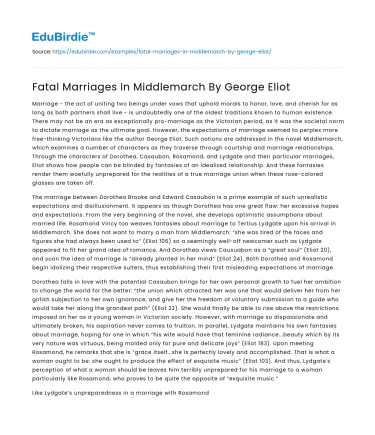Marriage - the act of uniting two beings under vows that uphold morals to honor, love, and cherish for as long as both partners shall live - is undoubtedly one of the oldest traditions known to human existence. There may not be an era as exceptionally pro-marriage as the Victorian period, as it was the societal norm to dictate marriage as the ultimate goal. However, the expectations of marriage seemed to perplex more free-thinking Victorians like the author George Eliot. Such notions are addressed in the novel Middlemarch, which examines a number of characters as they traverse through courtship and marriage relationships. Through the characters of Dorothea, Casaubon, Rosamond, and Lydgate and their particular marriages, Eliot shows how people can be blinded by fantasies of an idealized relationship. And these fantasies render them woefully unprepared for the realities of a true marriage union when these rose-colored glasses are taken off.
The marriage between Dorothea Brooke and Edward Casaubon is a prime example of such unrealistic expectations and disillusionment. It appears as though Dorothea has one great flaw: her excessive hopes and expectations. From the very beginning of the novel, she develops optimistic assumptions about married life. Rosamond Vincy too weaves fantasies about marriage to Tertius Lydgate upon his arrival in Middlemarch. She does not want to marry a man from Middlemarch: “she was tired of the faces and figures she had always been used to” (Eliot 106) so a seemingly well-off newcomer such as Lydgate appeared to fit her grand idea of romance. And Dorothea views Causuabon as a “great soul” (Eliot 20), and soon the idea of marriage is “already planted in her mind” (Eliot 24). Both Dorothea and Rosamond begin idolizing their respective suiters, thus establishing their first misleading expectations of marriage.
Save your time!
We can take care of your essay
- Proper editing and formatting
- Free revision, title page, and bibliography
- Flexible prices and money-back guarantee
Dorothea falls in love with the potential Casaubon brings for her own personal growth to fuel her ambition to change the world for the better: “the union which attracted her was one that would deliver her from her girlish subjection to her own ignorance, and give her the freedom of voluntary submission to a guide who would take her along the grandest path” (Eliot 22). She would finally be able to rise above the restrictions imposed on her as a young woman in Victorian society. However, with marriage so dispassionate and ultimately broken, his aspiration never comes to fruition. In parallel, Lydgate maintains his own fantasies about marriage, hoping for one in which “his wife would have that feminine radiance...beauty which by its very nature was virtuous, being molded only for pure and delicate joys” (Eliot 183). Upon meeting Rosamond, he remarks that she is “grace itself...she is perfectly lovely and accomplished. That is what a woman ought to be: she ought to produce the effect of exquisite music” (Eliot 103). And thus, Lydgate's perception of what a woman should be leaves him terribly unprepared for his marriage to a woman particularly like Rosamond, who proves to be quite the opposite of “exquisite music.”
Like Lydgate’s unpreparedness in a marriage with Rosamond, once married, Dorothea strives to help Causabon in his affairs, but in truth, he desires a wife that will not get involved with his work but more so take care of domestic affairs. Dorothea soon realizes that her marriage is not as fulfilling - both intellectually and emotionally—as she thought it would be. Almost similarly to Dorothea’s initial fascination with Casaubon, when Lydgate meets Rosamond he is impressed by her charms, talents, and beauty and thus indulges in his own fantasy about Rosamond being everything “a woman ought to be.” He is “completely mastered by the outrush of tenderness at the sudden belief that this sweet young creature depended on him for her joy” (Eliot 189). With time, however, both Rosamond and Lydgate soon realize that they have deceived themselves, which the narrator had previously foreshadowed: “Poor Lydgate! Poor Rosamond! Each lived in a world in which the other knew nothing” (Eliot 185).
The marriage between Rosamond and Lydgate is a clear image of the violent shattering of expectations, as both enter their union with shockingly false ideas of one another and ultimately with no inclination to compromise. Rosamond is devastated to discover that Lydgate does not see the necessity in living at the level of luxury she sees as obligatory. Eliot metaphorically compares their marriage to a “delicate crystal” to convey the fragility and marred beauty, of their union. Dorothea and Rosamond - and of course Lydgate and Casaubon - indeed face the difference between what they expect from marriage, and what they receive. However, Dorothea learns from this eye-opening experience and brings her newfound knowledge when she marries Will Ladislaw after Casaubon's death. She finally gains autonomy, and Rosamond, it seems, will continue to learn the art of compromise for the remainder of her life.
Dorothea and Rosamond are not content with the normal ways of Middlemarch, and the two women seek ways to escape what they discern as their society’s mediocrity. Dorothea learns to save herself through compromise, and her perseverance comes from her own will to do so. And thus Eliot reveals a significant theme within the novel: compromise, which is a vital part of marriage. The reality of married life consists of expectations, disappointments, and understandings. And ultimately one cannot have a successful marriage without reaching the final, almost ego sacrificing step: compromise.






 Stuck on your essay?
Stuck on your essay?

